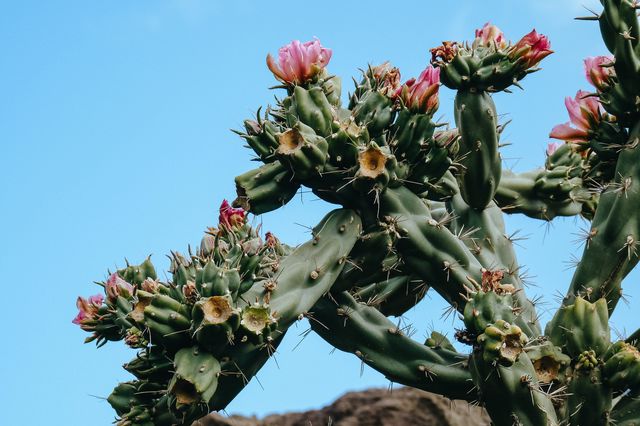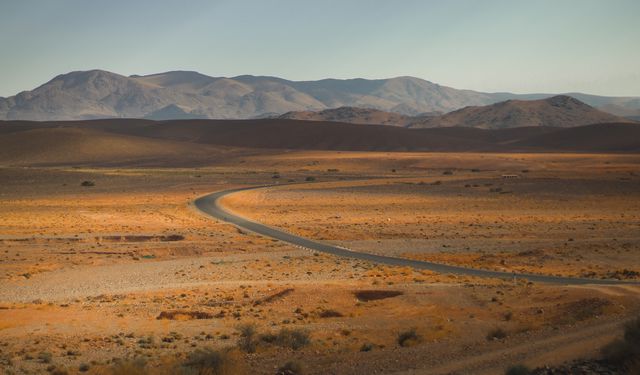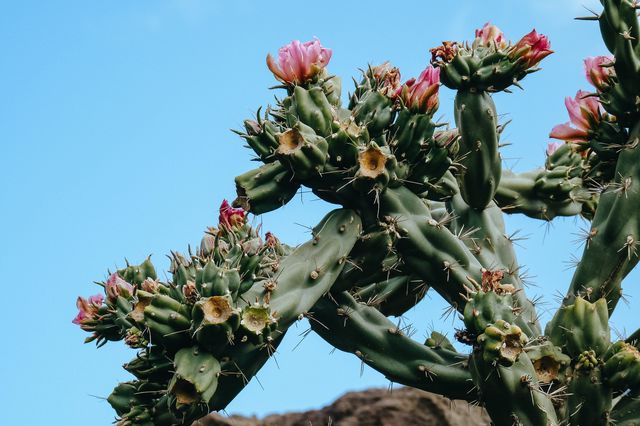
The wilderness and the dry land shall be glad;
the desert shall rejoice and blossom;
like the crocus 2 it shall blossom abundantly
and rejoice with joy and shouting.
For waters shall break forth in the wilderness
and streams in the desert;
7 the burning sand shall become a pool
and the thirsty ground springs of water;
the haunt of jackals shall become a swamp;[b]
the grass shall become reeds and rushes.8 A highway shall be there,[c]
Isaiah 35: 1-10
and it shall be called the Holy Way;
the unclean shall not travel on it,[d]
but it shall be for God’s people;[e]
no traveler, not even fools, shall go astray.
9 No lion shall be there,
nor shall any ravenous beast come up on it;
they shall not be found there,
but the redeemed shall walk there.
10 And the ransomed of the Lord shall return
and come to Zion with singing;
everlasting joy shall be upon their heads;
they shall obtain joy and gladness,
and sorrow and sighing shall flee away.
Several years ago, I had a friend who spent a month in Mexico City. It was an immersive experience, giving her the opportunity to learn Spanish. During the last week, I went down to visit her. An amazing opportunity for her to immerse herself in a language and a culture was, for me, a disorienting experience.
I was staying with someone with whom I couldn’t speak because of the language. Mexico City is a huge city, and it didn’t matter which corner I turned because I didn’t know where I was (this was way before the days of GPS and Google Maps). I enjoyed being with my friend and her group, but I was never fully at ease.
One of the most devastating experiences in the history of Israel was the Exile. My experience in Mexico City was a slight taste of what it must mean to be in exile…but only a slight taste. I was in Mexico City for a week; Israel was in exile for 70 years. I knew I was leaving in a few days; Israel had no idea how long they would be there or if they would ever return home.
Going to Mexico City was my choice. Israel watched their beloved Jerusalem destroyed, as they were enslaved and forced to a place where the language and the culture was different. I was surrounded by strangers; Israel was surrounded by enemies. My experience was disorienting; for Israel, exile threatened their very existence. How do they respond to that kind of situation?

Amazingly, these words from the prophet Isaiah are part of their response. The images of joy dance across the page. There are words about flowers blooming and waters breaking forth. There are words about people breaking forth in song. There are words about people receiving everlasting joy and gladness.
But notice the setting of these delightful images. The flowers are blooming…in the desert. The burning sand becomes a pool of water. In the wasteland where there are no roads, it gives way to a highway that leads them back home. It is a place where they are safe. And yet, these words of joy are spoken while they are still in exile.
Wilderness is a powerful image for the people of Israel. Yes, it is a place where water is scarce, and crops do not grow. It is wide and dangerous. It is easy to get lost.
But the wilderness is also a place of flight and freedom. It is the place where Hagar fled from the anger of Sarah. It is place where the Israelites went when they were liberated from slavery in Egypt.
It was in the wilderness that God cared for and guided and protected God’s people. God fed them and quenched their thirst. Most importantly, the wilderness was the place where God’s people learned to trust this liberating God.
As I mentioned in my first reflections on joy, we see again the distinction between joy and happiness. Joy is not dependent upon circumstances. In fact, it is in difficult times that we are invited to open our lives to the possibility of joy. The present circumstances, whatever they are, are not the final word; they are not a prediction of the future.
70 years. 25,500 days. A lifetime for many. Exile becomes the norm. It becomes who they are. And yet, stirring within them are these promising images of joy. What is now is not what will be. The promise of this good news is that there is a power that can transform ordinary lives and even the realities of the world. And that brings joy.
This joy is not something that we generate. We cannot make the desert bloom.
We cannot make the burning sand into pools of water. We cannot build a highway through the trackless wilderness. The circumstances and places that need to be changed can only be changed by the power and presence of God.

These days many of us are experiencing hardships that dull our senses, slow our steps, and fill us with anxiety. The image of a wilderness is a fitting description for the daily lives of so many. As I write this people are being forced into exile or having been living in exile for years. But there are so many other kinds of exile: political, financial, cultural, religious, person. I do not want to minimize the pain that people feel in these exiles. But the promise of Isaiah 35 is that this pain is not the final word. You do not walk alone.
I spoke of how my trip to Mexico City was disorienting, but it was more than that. Much more. There were delightful moments of eating, drinking, roaming about, and dancing with people who were strangers but became my friends. Joy, it seems, is not a solitary experience. Joy is always connected to others. And when we find ways to share ourselves with others, we bring joy to us and to them, no matter the circumstances.
